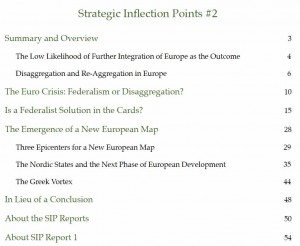We have just published the second Strategic Inflection Report. This report focuses upon the Euro crisis and its strategic consequences.
The Euro crisis is not simply a financial dynamic. It is the end of a period of history.
The confluence of several trend lines: the unification of Germany, the end of the Soviet Union, the collapse of the Berlin Wall, the expansion of NATO, the expansion of the European Union AND the creation of the single currency together constitute a unique period in modern European history.
The trend line was also defined by moving the borders of Europe eastward with the expectation that an expanded Europe would manage its own internal dynamics well and provide stability in an historically unstable region of the world.
However, the Euro crisis is also gradually revealing serious flaws in the functionality of both the European Union and NATO. The two decades of European consolidation and expansion are now confronted with new centrifugal forces that are again widening political, social, economic and security differences within the EU and among its neighbors. Deepening recession and severity of its impact on employment and well being of citizens are increasing these differences and encouraging re energized nationalism and renewed political localization.
Europe will now be challenged in the form of rollbacks of the many intertwined strands of integration, fraying what has been an intricate but incomplete tapestry. It is questionable whether Europe will be to prevent stalling of the integration process in the face of widening gaps among the interests of each nation and even within each nation.
Can Europe devise a new, positive path, a new trajectory of interaction within Europe and between Europeans and the rest of the world?
In addressing this question, it will not be the views of Europe’s intellectuals, strategists, or Eurocrats that matter; it will be how voters, politicians and public conflicts define the re-configured Europe.
This re-configuration will not be defined behind closed doors in Brussels, but in the heat of political and economic conflict, under the influence of outside of Europe events and stakeholders, and in positions taken by key nations seeking primacy in the new Europe.
The report looks at the prospects of further integration and counter balances these prospects against the more significant prospect of disaggregation and re-aggregation. The result will be a new political map of Europe.
We have discussed this map in terms of three dynamics: the formation of the Ger-Euro, the enhanced role of the Nordic states forged around their Arctic destiny, and the implosion of Greece. In future reports, there will be a continuing focus on other dynamics of disaggregation and the re-shaping of Europe.
We believe that the impact of outside powers will be significant in the period ahead in shaping the European map as we have known it in recent decades.
The report sketches the contours of such a map and its strategic consequences.
Credit Featured Image: Bigstock
The report has been featured on AOL Defense.
For a copy of the report go to


